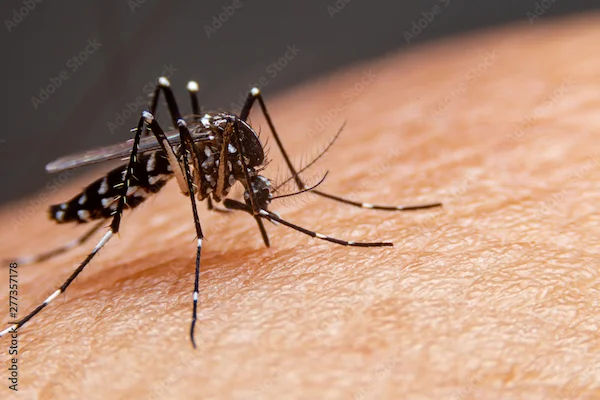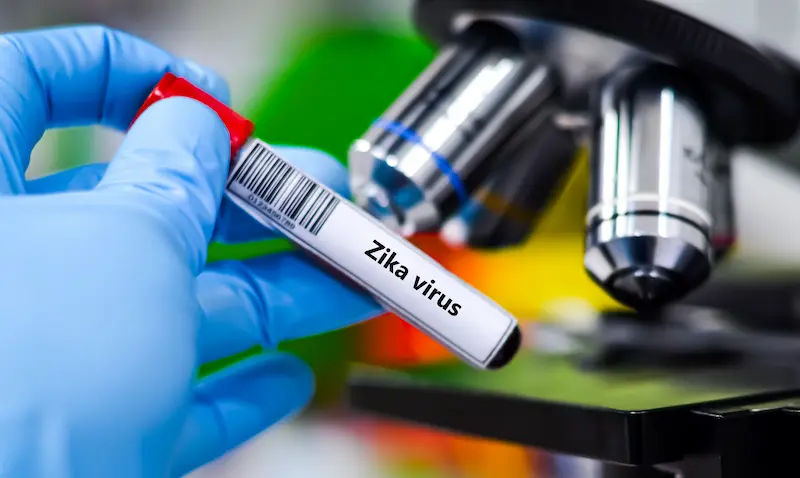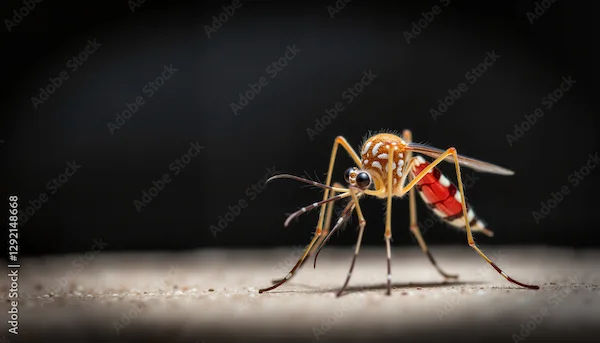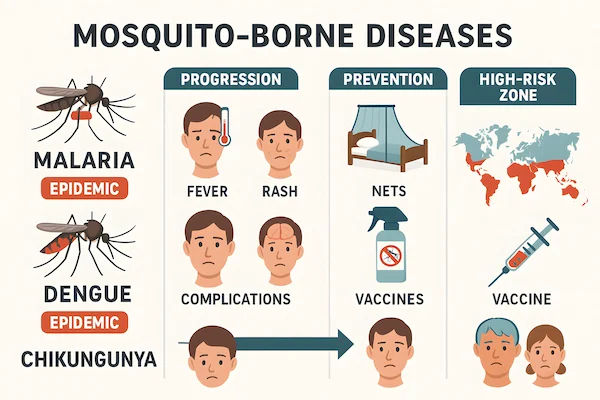Dengue Fever: Recognise the Signs, Get the Right Diagnosis
Learn the early signs of dengue fever, how it is diagnosed, and essential prevention tips to protect yourself and your family from this mosquito-borne illness.

Written by Dr. J T Hema Pratima
Reviewed by Dr. Shaik Abdul Kalam MD (Physician)
Last updated on 13th Jan, 2026
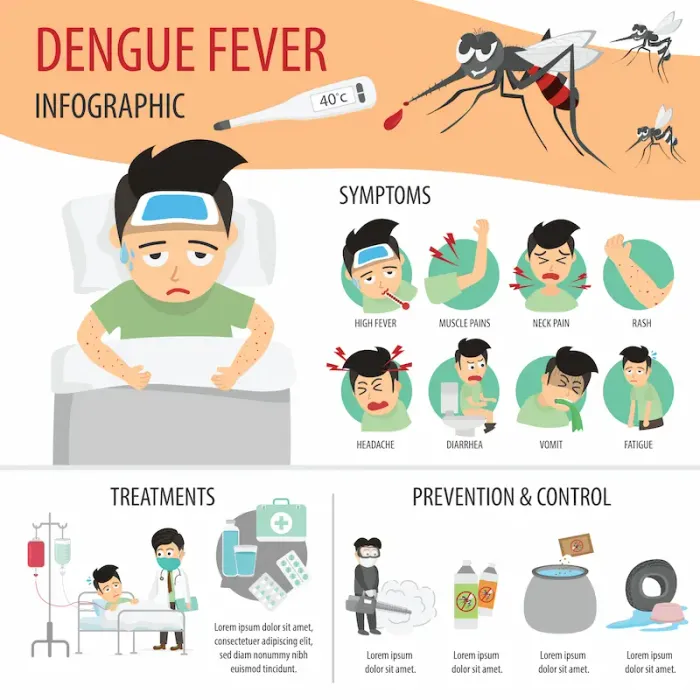
Introduction
Dengue fever is a mosquito-borne illness that affects millions of people across the globe each year, particularly in tropical and subtropical climates. Caused by the dengue virus, it can range from a mild, flu-like sickness to a severe, sometimes fatal condition. Recognising the signs of dengue fever early is crucial for getting a prompt diagnosis and managing the disease effectively. This sudden onset of high fever, severe body aches, and intense headache can be alarming, but understanding what to look for can make all the difference. This comprehensive guide will walk you through the symptoms, explain the diagnosis process in detail, and provide actionable steps for prevention and care. Whether you're seeking information for yourself or a loved one, knowing these key facts about dengue is your first line of defense.
What Exactly is Dengue Fever?
Dengue fever is a viral infection transmitted to humans through the bite of an infected female Aedes mosquito. It is not contagious and cannot spread directly from person to person. The disease is caused by one of four closely related virus serotypes (DENV-1, DENV-2, DENV-3, and DENV-4). Recovery from one serotype provides lifelong immunity against that specific one, but subsequent infections by different serotypes increase the risk of developing severe dengue.
How Dengue Spreads: The Aedes Mosquito
The primary vector for the dengue virus is the Aedes aegypti mosquito. This mosquito is easily identifiable by the distinctive white bands on its legs. It is a daytime biter, with its most active periods being early in the morning and just before dusk. It typically breeds in clean, stagnant water commonly found in urban and semi-urban areas—like in water tanks, discarded tires, flower pots, and uncovered water containers.
Consult a Specialist for the best advice
The Critical Signs and Symptoms of Dengue
Symptoms usually begin 4-10 days after being bitten by an infected mosquito and can last for 2-7 days. The presentation can vary widely.
Mild Dengue Fever Symptoms
Many people, especially children and those experiencing their first infection, may have no symptoms at all. When present, mild dengue symptoms often mimic a severe flu:
• Sudden high fever (104°F or 40°C)
• Severe headache, particularly behind the eyes
• Intense muscle, joint, and bone pain (giving it the nickname "breakbone fever")
• Nausea and vomiting
• Pain behind the eyes
• Swollen glands
• A characteristic skin rash that may appear a few days after the fever
Warning Signs of Severe Dengue (Dengue Hemorrhagic Fever)
After the initial fever declines, a small portion of cases can progress to severe dengue, also known as dengue hemorrhagic fever or dengue shock syndrome. This is a medical emergency. Warning signs of severe dengue typically appear 24-48 hours after the fever has gone and include:
• Severe abdominal pain and tenderness
• Persistent vomiting (often with blood)
• Bleeding from the gums or nose
• Blood in urine, stools, or vomit
• Rapid breathing
• Fatigue, restlessness, and irritability
• A sudden drop in platelet count
The Three Phases of Dengue Infection
Understanding the typical progression of dengue can help in monitoring the illness.
The Febrile Phase
This initial phase is characterised by the sudden high fever and the intense pains mentioned above. It typically lasts for 2-7 days.
The Critical Phase
As the fever subsides, the critical phase begins. This is when plasma leakage can occur, leading to fluid accumulation, respiratory distress, and severe bleeding. This phase lasts for 24-48 hours. Not every patient enters this phase, but close monitoring for the warning signs of severe dengue is essential during this time.
The Recovery Phase
If the critical phase is successfully navigated, the patient enters the recovery phase. There is a gradual reabsorption of leaked fluids, improved appetite, and a sense of well-being. A second, itchy rash may appear during this phase. It's crucial to avoid fluid overload during recovery.
How is Dengue Fever Diagnosed?
Diagnosing dengue based on symptoms alone is challenging because it resembles other illnesses like chikungunya, Zika, and malaria. A proper dengue fever diagnosis requires a combination of clinical evaluation and specific laboratory tests.
Physical Examination and Medical History
A doctor will assess your symptoms, their duration, and your travel history to determine if you've been in an area where dengue is prevalent. They will also check for clinical signs like a rash, tenderness, or any bleeding manifestations.
Key Laboratory Tests for Dengue
Lab confirmation is vital. How to test for dengue fever involves a few key assays:
NS1 Antigen Test
This test detects the presence of the non-structural protein 1 (NS1) of the dengue virus in the blood. It is most effective within the first 3-5 days of illness (the febrile phase) before the body starts producing a significant number of antibodies. A positive NS1 test is a clear confirmation of a current dengue infection.
Dengue Antibody Tests (IgM and IgG)
These tests look for antibodies your immune system produces to fight the infection.
• IgM antibodies are the first to appear, typically becoming detectable after 3-5 days. A positive IgM test suggests a recent infection.
• IgG antibodies appear later and remain in the body for life. A high level of IgG can indicate a past infection. The ratio of IgM to IgG helps determine if it's a primary or secondary infection.
Complete Blood Count (CBC)
This is not a direct test for the virus but is critically important. A CBC will show a drop in the platelet count in dengue (thrombocytopenia) and an increase in hematocrit (due to hemoconcentration from plasma leakage), which are key indicators of disease severity and progression.
If you suspect you have dengue, it's important to get tested promptly. Apollo24|7 offers a convenient home collection for tests like the Dengue NS1 Antigen and CBC, allowing you to get an accurate diagnosis without needing to travel while you're unwell.
Get Your Health Assessed
Dengue Treatment: Managing the Symptoms
There is no specific antiviral medicine to treat dengue. Treatment is supportive and focuses on managing symptoms and preventing complications.
Home Care and Relief Measures
For mild cases, doctors recommend:
• Rest: Allow your body to fight the virus.
• Hydration: Drink plenty of fluids like water, oral rehydration solutions (ORS), or coconut water to prevent dehydration from fever and vomiting.
• Pain Relief: Use analgesics like acetaminophen (paracetamol) to reduce fever and alleviate pain. It is crucial to avoid NSAIDs like ibuprofen or aspirin, as they can increase the risk of bleeding.
• Monitor: Keep a close watch for any warning signs of severe dengue.
Hospitalisation for Severe Dengue
Severe cases require immediate hospitalisation. Treatment typically involves:
• Intravenous (IV) fluid replacement to maintain electrolyte balance and prevent shock.
• Blood transfusion in cases of severe bleeding.
• Continuous monitoring of vital signs, platelet count, and hematocrit.
Top Strategies for Dengue Prevention
Since there is no definitive cure, dengue prevention is the best strategy.
Mosquito Control: Stop the Breeding
The most effective method is to eliminate mosquito breeding sites:
• Regularly empty, clean, or cover containers that hold water (pots, buckets, tanks, tires).
• Ensure proper waste disposal and avoid accumulating garbage.
• Use mosquito larvicides in standing water that cannot be emptied.
• Support community-level fogging and cleaning initiatives.
Personal Protection: Avoid Bites
• Use EPA-registered insect repellents containing DEET, Picaridin, or Oil of Lemon Eucalyptus.
• Wear long-sleeved shirts and long pants, especially during daytime hours.
• Use mosquito nets while sleeping, preferably insecticide-treated ones.
• Install screens on windows and doors to keep mosquitoes out.
Conclusion
Dengue fever remains a significant public health challenge, but it is a manageable one with the right knowledge. Recognising the early signs of dengue fever and understanding the importance of a timely diagnosis can drastically improve outcomes and prevent the progression to severe disease. While most cases are mild, the potential for severity means that vigilance is key—especially in monitoring for warning signs during the critical phase. Remember, prevention is always better than cure. By taking proactive steps to control mosquitoes and protect yourself from bites, you can significantly reduce your risk. If you or a family member develop a high fever with any of the symptoms described, consult a doctor online with Apollo24|7 for an initial evaluation and to determine if testing is needed. Staying informed and prepared is your best defense against dengue.
Consult a Specialist for the best advice
Consult a Specialist for the best advice

Dr Suseela
General Physician
5 Years • MBBS
Bengaluru
Apollo Medical Center, Marathahalli, Bengaluru

Dr. Ritesh Motghare
General Practitioner
18 Years • MBBS PGCDM
Nagpur
HEALTH CENTRE VNIT NAGPUR, Nagpur

Dr. Abhirup Chakrabarti
General Practitioner
10 Years • MBBS
Chennai
Dr Abhirup Chakrabarti, Chennai

Dr. Pankaj Tripathi
General Practitioner
20 Years • MBBS, MD Pathology
Lucknow
Best Diabetologist Clinic, Lucknow

Dr. Vivek D
General Physician
4 Years • MBBS
Bengaluru
PRESTIGE SHANTHINIKETAN - SOCIETY CLINIC, Bengaluru
Consult a Specialist for the best advice

Dr Suseela
General Physician
5 Years • MBBS
Bengaluru
Apollo Medical Center, Marathahalli, Bengaluru

Dr. Ritesh Motghare
General Practitioner
18 Years • MBBS PGCDM
Nagpur
HEALTH CENTRE VNIT NAGPUR, Nagpur

Dr. Abhirup Chakrabarti
General Practitioner
10 Years • MBBS
Chennai
Dr Abhirup Chakrabarti, Chennai

Dr. Pankaj Tripathi
General Practitioner
20 Years • MBBS, MD Pathology
Lucknow
Best Diabetologist Clinic, Lucknow

Dr. Vivek D
General Physician
4 Years • MBBS
Bengaluru
PRESTIGE SHANTHINIKETAN - SOCIETY CLINIC, Bengaluru
More articles from Dengue
Frequently Asked Questions
1. How long does dengue fever last?
The acute febrile phase typically lasts 2-7 days. Full recovery, including fatigue and weakness, can take several weeks.
2. What is the platelet count in dengue, and when is it dangerous?
A normal platelet count is 150,000–450,000 platelets per microliter of blood. In dengue, this count can drop significantly (thrombocytopenia). A count below 100,000 is a concern, and below 20,000-40,000 often requires medical intervention and monitoring due to the risk of bleeding.
3. Can you get dengue twice?
Yes. There are four different dengue virus serotypes. Infection with one provides lifelong immunity only to that specific serotype. A second infection with a different serotype actually increases the risk of developing severe dengue.
4. What is the best way to increase platelets in dengue naturally?
While no food can drastically increase platelets, a healthy diet can support recovery. Focus on staying hydrated and eating nutrient-rich foods like papaya leaf extract (consult your doctor first), pumpkin, pomegranate, and foods rich in Vitamin C and Iron. However, medical supervision is essential for managing low platelet counts.
5. What is the difference between dengue and viral fever?
'Viral fever' is a general term for fevers caused by various viruses. Dengue is a specific type of viral fever with a distinct set of symptoms (severe joint pain, rash, potential for bleeding) and is caused by a specific virus transmitted by mosquitoes. Lab tests are needed to confirm a dengue diagnosis.

